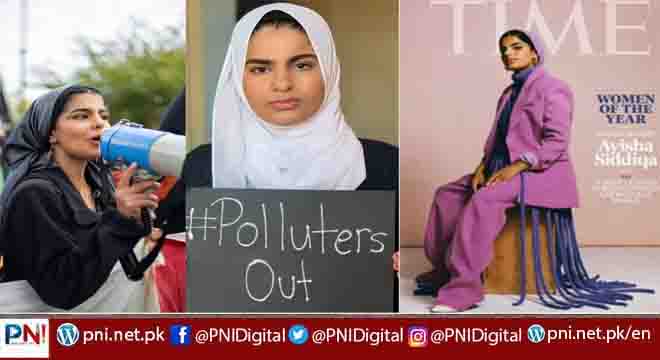NEW YORK, Mar 03 (APP): Pakistan’s climate defender Ayisha Siddiqa is among US Time magazine’s twelve 2023 Women of the Year, calling them “extraordinary leaders who are working toward a more equal world”.
The mass circulation weekly magazine will host its second annual Women of the Year Gala on International Women’s Day, March 8, in Los Angeles.
Coming from a tribal community in Northern Pakistan, Ayisha Siddiqa, 24, became a climate and human rights defender after being a personal victim of climate change, according to Time’s write-up. She realized at the age of 14 that the environment around her is not safe.
Considered a potent voice in climate change activism, she addressed the 27th session of the Conference of the Parties to the UNFCCC (COP27) in Sharm El-Sheikh Egypt last year and shared her poem “So much about your sustainability, my people are dying”.
Other honourees include actor and UNHCR Ambassador Cate Blanchett, actor Angela Bassett, musical artist Phoebe Bridgers, writer, producer, and actor Quinta Brunson, soccer player and champion of equal pay Megan Rapinoe, professional boxer and refugee advocate Ramla Ali, Iranian journalist Masih Alinejad, activist and leader of war efforts for women in Ukraine Olena Shevchenko, incoming CEO of Suntory Beverages Makiko Ono, reproductive rights activist Verónica Cruz Sánchez and Brazil’s Minister of Racial Equality Anielle Franco.
Raised in a matriarchal household, some things became deeply entrenched in Ayisha Siddiqa’s consciousness, motivating her to help the vulnerable and hold polluters accountable, according to the publication.
“I was raised with the idea that the earth is a living being, that she gives life to you and in return, you have a responsibility,” she told Time. “And I think we, collectively, have come to a point where we are ignoring the cries of earth mother.”
Siddiqa said, “We have reached a point where we are collectively ignoring the cries of mother earth. This is how the climate crisis is linked to women and girls because of the same structures that are abusing, hurting, and taking without consent.
“This is how we treat planet earth. This is how we treat the very thing which gives us life”, she added.
Siddiqa highlighted last year’s flooding in Pakistan, saying, “In South Asia, climate change disproportionately affects women. When people are displaced, women have to go get water, raise the children, women have to find work. There were 60,000 women that were pregnant during August and we didn’t have enough haemoglobin, collectively, to save them.”
“When they were giving birth, lots of mothers lost their lives,” said. “We are reaching the climate crisis with a very global north lens.”
“We need to think more dynamically about the solutions,” she said. “The majority of the world that is facing the effects of climate change is actually citizens of unstable governments.’
“This is what we have to critically apply as part of the equation when we think of climate solutions when we think of legal solutions, economic and technical solutions,” Siddiqa noted.
“We need to do it fast,” she added.
Follow the PNI Facebook page for the latest news and updates.









